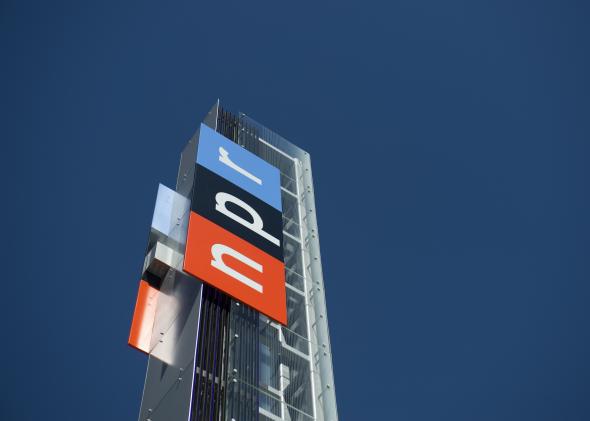NPR Initiates Phase Two of Plan to Become the Pandora of News

Photo by SAUL LOEB/AFP/Getty Images
The announcement by National Public Radio that it’s opening access to an application programming interface, or API, seemed like it should be of interest only to a relative handful of tech developers.* In fact, it is a significant and smart next step in NPR’s strategy to become the Pandora of news.
In 2014, NPR introduced a streaming player, NPR One; podcasts and NPR One are NPR's fastest-growing digital properties. Demian Perry, NPR's director of mobile, now says, "We have tested and refined the experience to the point that it is ready to scale to multiple platforms," in addition to its current roster of major hitters: iOS, Android, Windows Phone, etc. But NPR is a lean organization—how can it create versions of the player for the hundreds of new versions of smartphones, tablets, wearables, and who-knows-what's-next else without setting its pledge drive to stun?
Answer: You open up an API to let other developers to do it for you.
You can think of an API as a website designed to be accessed by applications requesting data from that site.* Some APIs are intended to enable developers to come up with their own novel ways of using an organization's data, but as the new NPR One Developer Center makes clear, this API is solely intended to be used by authorized developers who are creating device-specific versions of the NPR One player.
Like Pandora, NPR One fetches content from the cloud—in this case, NPR's—based on each individual user’s pattern of behavior. Also like Pandora, the NPR stream continuously adjusts to listeners' preferences as expressed by their behavior. "If they mark a story as interesting or skip it, we gather that data," says Perry, "and over time we’re able to use that listening history to predict what their rating will be on every news story that’s being released today.” As a result, “we can put the story you’re most likely to enjoy as the next one in your queue.” (But unlike Pandora: unlimited skips.)
As the players proliferate across platforms, NPR will know what you have already heard across whatever set of devices you listen on. You won’t get the same story twice, even if you switch devices. NPR might, however, serve you a Cinco de Mayo story from a few years ago on some future May 5 if your behavior indicated that you liked this year’s story, and if you haven't already heard the archived story. (Perry points out that this is another difference from Pandora: Users of the music streaming service like to hear content more than once.)
Developers have to be authorized by NPR because, says Perry, “We have to balance the need to keep our user data secure with our public media dedication to openness. ” For that reason, the “first tier” of developers will be “partners we’ve worked in the past or have a prior relationship with.”
The news comes a week after NPR’s April 29 announcement that virtually any piece of NPR audio content—more than 800,000 items—now can be embedded in a Web page by anyone who knows how to copy and paste HTML. For example, please enjoy:
These easy-bake widgets make it easier for sites to include particular NPR stories. The One Developer Center, on the other hand, speeds the deployment of NPR players that stream personalized news.
“The primary benefit [for NPR] is helping to create ubiquity for the NPR One listening experience,” says Perry. “We’re trying to take this experience and have it be accessible from every platform. Users can turn it on and get the same experience in their IOS app or their Web app or any device."
NPR being NPR, Perry says their recommendation algorithms will steer listeners away from comfortable filter bubbles. So no matter how hard you press the ”interesting" button for the Miley Cyrus think piece you just heard, NPR is still going to stream you that story about events in the Ukraine.
Classic NPR.
Correction, May 13, 12:30 p.m.: This post originally misstated that API stands for application program interface. It stands for application programming interface.
Update, May 15, 11:15 a.m.: This post was updated to clarify that not all API's are websites.
Future Tense is a partnership of Slate, New America, and Arizona State University.
